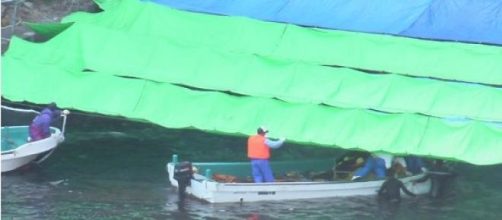Japanese fishermen from Taiji have vowed to continue their hunt for dolphins even though the zoos and aquariums have refused to buy the animals if the fishermen continue to hunt in such a controversial method. On Wednesday, Mr Yoshifumi, from the fishermen cooperative, clearly told reporters: "We will never stop hunting"
The press conference from Mr Yoshifumi, held in Taiji, western Japan, where the hunt will take place, came a week after the zoos and aquariums voted to stop receiving dolphins if the fishermen continue to catch them by "drive hunt", a fishing style that is looked down upon by the World Association of Zoos and Aquariums (WAZA).
The WAZA condemns "drive hunting", where fishermen push the dolphins into the bay by sound wand only to be barbarically slaughtered. Some of the locals and the fishermen themselves argue that the slaughter is quick and painless. "We don't understand which part of the drive hunt is considered barbaric", Mr Yoshifumi argued. "Harpooning dolphins used to be common over a decade ago but now we use a new and clean cutting system that severs the spine and kills the dolphins with little blood."
Taiji got worldwide attention after the release of the award winning documentary "The Cove", back in 2009. It showed the horrors of the dolphin hunt, with images of a group of dolphins being pushed into the bay and then slaughtered with knifes and spears, turning the waters red with blood.
The town and its dolphin hunt continues to attract protesters from animal rights groups, around the world, but the locals argue that these protesters are simply anti-Japanese and biased towards the town's traditions. Protesters also argue that with many people refusing to eat the dolphin meat, the quota of dolphins killed at the bay far surpassses the dolphin meat demand.
The fishermen cooperative charged zoos and aquariums more than¥1,000,000 (£5,256) for live dolphins. That money is believed to finance the hunt every year and even though the WAZA voted overwhelmingly to stop receiving or buying dolphins, a number of aquariums have already showed their opposition and are considering leaving the WAZA so they can receive dolphins in their parks.

